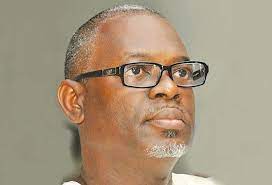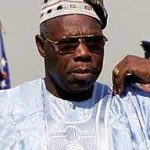On Monday morning I got a telephone call from Akin Oshuntokun, the managing director of the News Agency of Nigeria. We had established a relationship with Akin, before the 2003 elections, when he was part of the Obasanjo campaign team. He came to our office a couple of times to explain the perspective of candidate Obasanjo, as well as sometimes, even to take us up on what he perceived to be our bias against his candidate. These visits included an opportunity we gave him to attend our editorial board meeting, in order to get a first hand experience of our often robust debates of issues, national and international.
Akin had just finished reading Kabiru Yusuf’s column for the week, THE KUKAH I DIDN’T KNOW, which I felt was particularly well written and so reflective of the deep anger in many parts of Nigeria about the curious choices Obasanjo made for the leadership of the National Conference. Akin asked me after the usual greetings, if people really felt that strongly about the choice of two Christians, Justice Niki Tobi and Rev. Fr. Mathew Hassan Kukah, as the head of the conference. I replied that the passion generated was very deep and it seemed to have become a trend for Obasanjo to make such insensitive appointments.
But Akin would not have any of that he reminded me of the nationalist credentials of President Obasanjo; adding for effect, that in the South West, Obasanjo is believed to be more Northern than the average Northerner. I was quick to reply-that the nationalist Obasanjo has transmuted, and has become more tribalist than the typical Afenifere zealot.
However, I also underlined the fact that I have had the opportunity in the past three years to meet Obasanjo on different occasions, citing the Sallah meeting we held with him at his Otta residence on November 29th, 2003 as an example.
I was happy about the nationalist forthrightness of his answer to a question from one of the Lagos journalists who had queried the distribution of Value Added Tax revenue nationally, especially to the Sharia states, who they accuse t)f iidt alidWlttg the Consumption of alcohol but would not mind to eolleet VAT revenue accruing from the sale of alcohol in the southern stated QfeaMfiflje had given a short shrift to the question, and re-iterated that we are attempting to build one country; such a country cannot be built on the basis of discriminatory practices.
We had ended our discussion on Monday morning with -Akin Oshuntokun agreeing that there is the need to understand ourselves better in Nigeria across all our divides, but above all the actions of the government must at all times respect the sensitivities of the Nigerian people. It was significant that this conversation took place, because in many ways, it confirmed that people take very seriously the opinions that we labour each week to paste on the pages of our newspapers, including the people in govemment.
It is however also indicative of the alienation of the people in government from the broad opinions of various constituencies in Nigeria, that Akin Oshuntokun would be asking me if the issue of the leadership of the National Conference was something to be worried about at all.
My surprise comes from the constituency that Akin represents, the vocal, newspaper-based, elite of the south west and the Lagos area, who for several years, spent each day of their access to the Lagos press to lampoon governmental appointments or policies’ in Nigeria’s recent past, that seemed to favour either Northern Nigeria or the Muslim community in general. It has become unfashionable, now that Obasanjo is in government, and everything apparently seems to be skewed in the direction of the Yomba elite and the south west, for commentators to be critical of Obasanjo and his administration.
The truth is that there is a Conflict of perception in the public arena today in Nigeria, about the policy choices, and performance of the Obasanjo administration. The spin doctors of the regime would like us to believe that these are the best of times for Nigeria; and who can blame them? The business lobby around the president is creaming off huge sums of money in all kinds of business deals and would therefore want Obasanjo to be seen in the best light possible.
On the other hand, the majority of the Nigerian people cannot understand why a supposedly democratic regime would be so hell bent on imposing policy instruments that cause so much hardship for them. At the street level, the perception of Obasanjo is one o f an uncaring, vindictive president, whose years his power have witnessed an ineredibie inflow of money into the nation’s goffers, but who nevertheless implement a project of government hostile to the poor, enamoured of foreigners, beholden to a business clique, and captive of technocrats doing the biddings of imperialism and foreign transnational capital.
Unfortunately for Obasanjo, his clique of technocrats deepen his alienation from the people because of their arrogance and disdain for the Nigerian people. They also compound their arrogance with an incredible level of incompetence which has cost Nigeria so much. For example the major plank of the government’s economic program is the unconstitutional process of privatisation of our national asset.
Yet despite all their arrogant posturing the program has been so badly handled and Nigeria has been so thoroughly short changed in many of these deals. We all remember the SOLGAS fiasco in respect of Nigeria’s most important industrial project, the Ajaokuta Steel Complex.
The SOLGAS chaps were brought in and at a point even the Secretary to the Government of the Federation had to issue a query, when allegations surfaced that they were beginning to pilfer equipment from the complex. After much damage, SOLGAS was eased out, an Indian outfit took over, and nobody was punished for the SOLGAS deal.
Obasanjo also gave out our National Hospital to a British consortium, even when Nigerians were administering the institution voty competently. But in the spirit of his regime, total surrender to the neo-liberal doctrine of market place capitalism, only foreigners are good enough to run big institutions. And run it they did, into crisis! Their incompetence became such an embarrassment that they were eventually eased out, after ensuring that our country has lost a tidy sum of money. But in tune with the anticorruption image of the regime, “again nobody was punished for the loss that our country suffered.
Then there is the PENTASCOPE mother of all deals! So .incredible was the disadvange to Nigeria, that the then newly appointed Minister of Communications, Cornelius Adebayo wrote a many-page memo to President Obasanjo, about the PENTASCOPE agreement. In less than two years, NITEL made a transition from being one of the most liquid government agencies, with a tremendous capacity for growth, to an agency that has to borrow money to pay salaries! All in the context of the madness of selling our country by the Obasanjo regime! Despite all these failings, the chaps Obasanjo gave the mandate to run the show have been so arrogantly unrepentant. Nasir el-Rufai, the architect of the PENTASCOPE deal, told the National Assembly body investigating the deal that “I have no apology to give. I have moved on and I have been promoted for what I did in BPE. We were the ones given the responsibility and we did it and our bosses were pleased.” So with this type of mindset, it is obvious that Nigeria is in deep trouble with Obasanjo and his technocrats.
Obasanjo believes fervently that his charity begins abroad, especially in the capitals of the Western countries. He jumps at every opportunity to go to Europe and America, can’t resist photo opportunities with George Bush, Tony Blair and others. To get their endorsement he zealously implements their recommended economic policies. The trips around the world are said to be in aid of getting debt relief, yet even he has just confessed that he had not made a headway in respect of debt relief. But I guess that he must have bought a new pair of knee pads, because he has also announced that he will begin His last round of trips around the world to beg for debt relief! We can safely assume that the new round of journey will last till 2007, and the result is similarly predictable, He will fail again.
It must however rankle Obasanjo and his spin doctors, who can’t stop telling us the progress we are making to see a new index on failed states or candidates for failure, which is based on a selected “Low Income Countries’ Under Stress (LICUS)” as defined by the World Bank to include Nigeria. This is according to the latest edition of THE ECONOMIST Magazine. The report says that “states can fail because of external shocks, or they can decay from within, or both.”
Nigeria, according to the report has an estimated 136million people and in 2002 it has a GDP per person of $300, while the annual GDP, percentage change, per person, between 1990 and 2002 is 0.30 The report further stressed that a couple of Oxford University based intellectuals “have tried to measure the cost of a typical poor country becoming a LICUS, ie, as unstable as‘Nigeria or Indonesia. They added together an estimate of growth forgone because of instability and an estimate of the spill over effect on neighbouring countries, and arrived at the startling figure of $82 billion.”
The argument that Nigeria is potentially a failed state is one that the government can be expected to take very seriously, because it is coming from a source that they have courted in recent times, THE ECONOMIST of London which recently organised an investment forum attended by Obasanjo himself.
A way out of the impasse? The six hundred million naira voted for image laundering can become useful here. The Nigerian political elite is a past master of the art of throwing money at problems, instead of creatively thinking out the solution to the issues at hand. It is not likely that they would do things differently with this new problem. So between performance and perception, Obasanjo isn’t just faring well in his husbandry of the Nigerian state.
The perception is far more negative than the credible performance. But he still has up to 2007 to make an effort in


